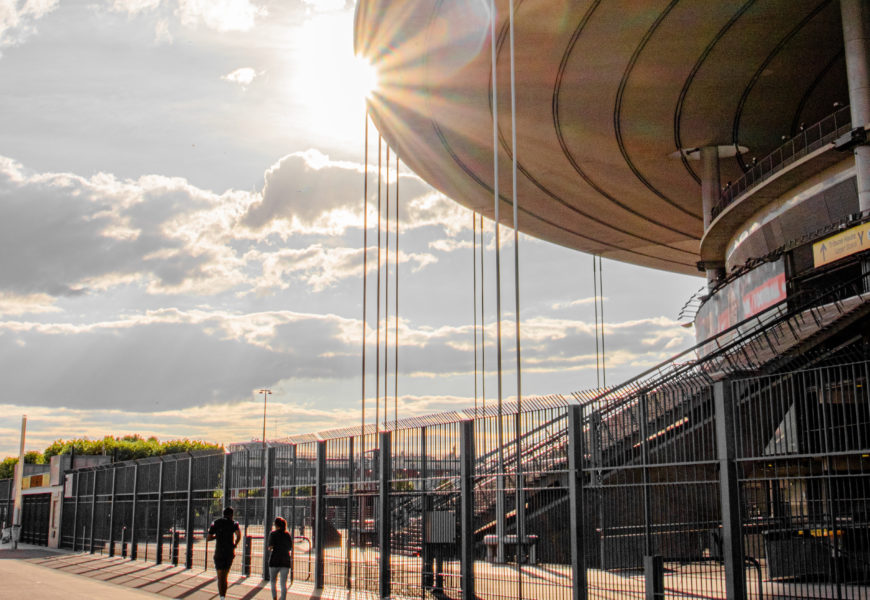Stade de France. Photo courtesy of David Peters/Unsplash.
Minutes after an international soccer match between France and Germany began on Nov. 13 at the Stade de France, tragedy struck Paris as ISIS initiated one of its first direct attacks on the Western world and the deadliest attack on Parisian soil since WWII. French President François Hollande was in attendance, and concern that the chaos close to the stadium would alarm crowds forced the game to finish prematurely. As fans eventually left the stadium, many only starting to hear of the full scope of the events outside, they joined in unison to sing the French national anthem.
The German national team was prevented from returning to its hotel due to the threat of further attacks, and instead spent the night in the stadium. The French team decided to join the Germans in a display of unity. One of Germany’s national soccer stadiums, the Allianz Arena, lit its exterior with the colors of the French flag. Many American professional and college sports teams waved or displayed the French flag before games in the aftermath of the Paris attacks. The Washington Capitals projected the French flag on to the ice before a game.
As harrowing as events like these are, sport has time and again proved its power to unite people across borders and languages in times of heartbreak and hardship. Citizens of all nations can relate to and celebrate the universal qualities that sport exemplifies: teamwork, selflessness, integrity and tenacity. The Paris attacks are only the most recent display of the strength of these values against tragic adversity. The French president’s presence at the Stade de France that evening may have created a conceivable target for ISIS, and it is exactly the above qualities combined with large crowds that make sporting events targets for terrorists seeking to instigate disorder. It is perhaps the power these qualities hold among a free society that offers some explanation as to why terror groups like the Taliban and ISIS condemn and prevent participation in and arrangement of sports.
A year prior to the Paris attacks, on Nov. 24 2014, a suicide bombing killed over 40 people at a volleyball game in Afghanistan. It was one of Afghanistan’s deadliest attacks that year despite its limited coverage by Western media. Many of the causalities were due to tightly packed spectators enjoying one of the country’s most popular sports.
A year before that, on April 15 2013, the Boston Marathon bombings rattled post-9/11 America. Immediately following the tragedy, countless sports events were canceled or rescheduled out of fear of a repeat attack. But this disruption did not last. Soon after, numerous teams responded and offered tribute to victims of the attack, including the Boston Celtics, New England Patriots and Boston Red Sox. When the Chicago Blackhawks defeated the Boston Bruins in the Stanley Cup final later that year, they honored the mourning city in The Boston Globe, admiring its sportsmanship and paying respect to those affected. The triumph of the Red Sox at the 2013 MLB World Series, if not viewed as helping to heal the city’s wounds, may be seen in some respects as catalyzing a return to normalcy and, ultimately, a triumph of those principles sport promotes. In the celebratory parade that followed, the players honored the victims at the marathon finish line.
This desire of the American sporting world to offer respect in the aftermath of tragedy, especially in contrast with the minimal reaction by journalists to the 2014 Afghanistan attack, reflects the permeation of sports across all aspects of American culture. In the grief that follows terrorist attacks, sporting events bring people together, offering reflection and an opportunity to move forward. This solidarity is not limited to American soil, however. The international response to the Boston Marathon bombings was overwhelming. Marathons and races across the globe that followed in the wake of the bombings organized vigils and fundraisers.
The sporting world, one that values overcoming challenges, adversity, and improbable outcomes while maintaining cohesion, is one that will likely always respond in unanimity to unfortunate events within and outside its discipline. The Paris attacks fortunately did not occur within the packed Stade de France, but the sporting world extended its solidarity to those affected regardless. •











[…] Sport: Medicine for Misfortune Minutes after an international soccer match between France and Germany began on Nov. 13 at the Stade de France, tragedy struck Paris as ISIS initiated one of its first direct attacks on the Western world and the deadliest attack on Parisian soil since … Read more on The Connecticut College Voice […]